#ResponsibleConsumption
Explore tagged Tumblr posts
Text
Bugün sizinle sürülebilir tatlılar hakkında oldukça ilginç bir pazar araştırması paylaşmak istiyorum. "Sürülebilir Tatlılar Ambalaj Renk Paketleme Analizi" başlıklı bu çalışma, FMCG (Hızlı Tüketim Ürünleri) sektöründe ambalaj renklerinin ve paketleme stratejilerinin tüketici tercihleri üzerindeki etkisini kapsamlı bir şekilde inceliyor.
Bu araştırmada, sürülebilir tatlıların ambalaj tasarımı, renk seçimi ve paketleme stratejilerinin tüketici davranışları üzerindeki etkisi detaylı olarak ele alınmış. Özellikle ambalaj renginin, tüketici algısı ve satın alma kararları üzerindeki belirleyici rolü ön plana çıkarılmış.
Çalışma, FMCG sektöründe faaliyet gösteren firmalar için ambalaj tasarımı ve renk seçiminde dikkat edilmesi gereken kritik noktaları ortaya koyuyor. Tüketici zihninde olumlu bir imaj yaratmanın ve markanın tercih edilme olasılığını artırmanın yollarını anlatıyor. Ambalajın görsel unsurlarının tüketici üzerindeki etkilerini anlamak isteyen herkes için oldukça değerli bilgiler içeriyor.
Eğer FMCG sektöründe çalışıyorsanız ya da pazarlama stratejileri ile ilgileniyorsanız, bu araştırma tam size göre. Makalenin tamamına ulaşarak detaylı bilgi ve analizleri görebilirsiniz.
#pazarlama#design#fmcg#package design#consumer behavior#organic#color psychology#cleanlabel#ecopackaging#EcoInnovation#ResponsiblePackaging#GreenConsumerTrends#SustainableSupplyChain#FoodPackagingTrends#EcoConsciousDesign#SustainableSweetTreats#GreenFMCG#EthicalSnacking#ResponsibleConsumption
2 notes
·
View notes
Text
Effective e-waste and plastic waste management is crucial for environmental sustainability, involving steps like recycling, public awareness, and supporting sustainable brands. Consumers can contribute by reducing, reusing, and recycling, and by making informed purchasing decisions.
#EWasteManagement#PlasticWaste#SustainableLiving#RecycleReduceReuse#EcoFriendly#EnvironmentalAwareness#GreenLiving#WasteReduction#ResponsibleConsumption#SaveThePlanet
0 notes
Text
Implementation of Stringent Standards for Electronic Products: A Technical and Environmental Necessity
The exponential growth of the electronics industry has brought with it a range of benefits in terms of connectivity and efficiency, but has also raised concerns about quality, safety, and sustainability. In this context, the imposition of stringent standards for electronic products has become an undeniable technical and environmental requirement for importing countries, aiming to protect the environment, public health, and economic interests.
Environmental Protection: Electronic products often contain a range of hazardous substances, such as heavy metals and toxic chemicals, which pose a threat to the environment when improperly disposed of. The imposition of quality standards during importation reduces the influx of defective or obsolete devices, consequently minimizing the volume of electronic waste and associated risks of environmental pollution.
Electronic Waste Management:
Effective electronic waste management is crucial to avoid environmental damage and preserve natural resources. Importing low-quality or disposable electronic products can overwhelm recycling and waste treatment systems in importing countries, leading to environmental contamination and additional costs for managing these materials. The enforcement of quality standards contributes to the adoption of more responsible production and consumption practices.
Public Health and Consumer Safety: Defective or low-quality electronic products pose significant risks to public health and consumer safety. Damaged or poorly designed components can result in safety failures, causing fires, explosions, or other forms of harm. The imposition of quality standards during importation ensures the integrity and reliability of products available in the market, protecting citizens from these potential risks.
Sustainable Development: Importing low-quality or disposable electronic products contradicts the efforts of importing countries to promote sustainable development. These products often have a short lifespan and contribute to a culture of excessive consumption and rapid disposal. The requirement for standards that promote the production and consumption of durable, repairable, and resource-efficient products is essential to achieve a greener and more circular economy.
Conclusion: In summary, the implementation of stringent standards for electronic products during importation is crucial to ensure the quality, safety, and sustainability of these products. In addition to protecting the environment, public health, and economic interests of importing countries, this measure contributes to the promotion of more responsible production and consumption practices. Through the adoption of higher technical and environmental standards, we can build a more sustainable and prosperous future for all involved in the international trade of electronic products.
#ElectronicStandards#QualityControl#EnvironmentalProtection#ConsumerSafety#SustainableTrade#EcoFriendlyProducts#WasteManagement#GlobalCommerce#TechRegulations#ResponsibleConsumption
0 notes
Text
Revolutionizing Environmental Sustainability: The e-Waste Management Project by WasteMaterial
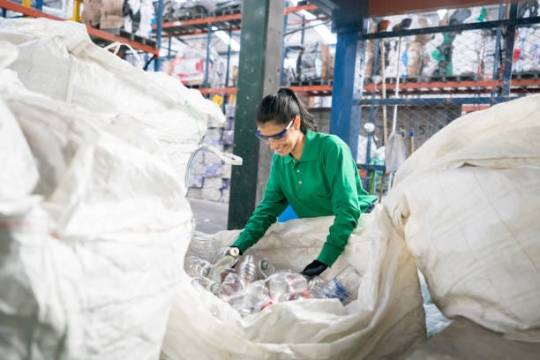
Understanding the E-Waste Predicament
The proliferation of electronic devices has resulted in a staggering amount of e-waste worldwide. From smartphones to laptops, these devices contain hazardous materials like lead, mercury, and cadmium, posing severe risks to human health and the environment if improperly disposed of. Unfortunately, traditional waste management systems often fall short in handling this specialized category of waste, leading to rampant pollution and resource depletion.
WasteMaterial: Leading the Charge for Change
Enter WasteMaterial, a visionary company dedicated to revolutionizing e-waste management. With a keen focus on sustainability and innovation, WasteMaterial has developed a comprehensive project aimed at mitigating the adverse effects of e-waste on our planet. Their holistic approach encompasses various facets of e-waste management, setting new standards for environmental responsibility and corporate citizenship.
Key Components of WasteMaterial’s E-Waste Management Project
Collection and Recycling: WasteMaterial operates a widespread network for the collection of e-waste, ensuring convenient disposal options for consumers and businesses alike. Through strategic partnerships with recycling facilities, they ensure that collected e-waste undergoes proper dismantling and recycling processes, minimizing the release of hazardous substances into the environment.
Resource Recovery: Recognizing the value of materials embedded in electronic devices, WasteMaterial emphasizes resource recovery as a cornerstone of their project. By employing advanced techniques such as material separation and extraction, they recover valuable metals and components from e-waste, reducing the need for virgin resources and promoting a circular economy.
Awareness and Education: WasteMaterial understands that sustainable change begins with education. As part of their project, they conduct extensive awareness campaigns and educational programs to enlighten communities about the importance of responsible e-waste management. By fostering a culture of environmental consciousness, they empower individuals to make informed choices and actively participate in waste reduction efforts.
Innovation and Research: With a commitment to continuous improvement, WasteMaterial invests in research and development to explore innovative solutions for e-waste management. From novel recycling technologies to eco-friendly product design, they strive to push the boundaries of sustainability and set new industry benchmarks.
Impact and Sustainability
The impact of WasteMaterial’s e-waste management project extends far beyond mere waste disposal. By diverting e-waste from landfills and incinerators, they prevent the release of harmful pollutants into the air, soil, and waterways, safeguarding ecosystems and public health. Moreover, their emphasis on resource recovery reduces the demand for raw materials, conserving natural resources and mitigating environmental degradation.
Join the Movement
As champions of environmental sustainability, WasteMaterial invites individuals, businesses, and policymakers to join their movement for responsible e-waste management. By supporting initiatives like theirs, we can collectively combat the e-waste crisis and pave the way for a greener, more sustainable future.
In conclusion, WasteMaterial’s e-waste management project stands as a testament to the power of innovation and commitment in addressing pressing environmental challenges. Through their pioneering efforts, they offer a glimmer of hope amidst the looming specter of e-waste, inspiring us to rethink our relationship with technology and the environment. Together, let us embrace the ethos of sustainability and propel towards a cleaner, healthier planet for generations to come.
#EcoFriendlyTech#GreenInnovation#SustainableLiving#CircularEconomy#ReduceReuseRecycle#DigitalResponsibility#TechRecycling#ConsciousConsumption#GreenTechnology#WasteFreeWorld#EnvironmentalStewardship#EcoConscious#ZeroWasteGoals#GreenFuture#SustainableSolutions#RenewableResources#PlanetFirst#EcoAwareness#ResponsibleConsumption#CleanTech#WasteReduction#EcoInnovation#SustainableBusiness#EarthFriendly#GreenRevolution#SustainableDevelopment#EcoFriendlyProducts#ClimateAction#GreenEfforts#WasteManagementHeroes
1 note
·
View note
Text
Sustainable Packaging Design for Products | Eco-Friendly Solutions
Explore eco-friendly solutions for sustainable product packaging design, prioritizing environmental conservation, promoting a greener future, and meeting the growing demand for responsible consumer choices. Dive into our comprehensive range of innovative packaging materials and design options, crafted to minimize environmental impact while maximizing product protection and brand integrity. Discover how The Mend Packaging is revolutionizing the industry with its commitment to sustainability, transparency, and ethical business practices. Join us in our mission to create a more sustainable world through thoughtful packaging design and eco-conscious solutions.
#EcoFriendlyPackaging#SustainableDesign#GreenPackaging#EnvironmentalConservation#GreenerFuture#ResponsibleConsumption#SustainableSolutions#PackagingInnovation#EthicalBusiness#Sustainability#Transparency#EcoPackaging
0 notes
Text
Indian Recycle Industry of Electronic Goods
Written By: Jagriti Shahi
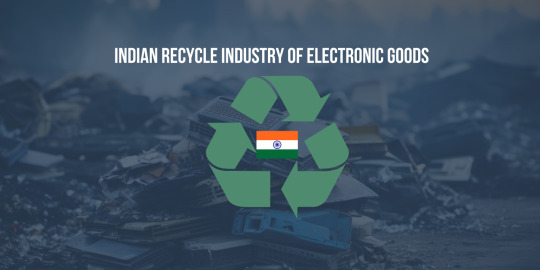
Introduction
In an era dominated by technological advancement, the rapid evolution of electronic devices has led to a consequential surge in electronic waste (e-waste) worldwide. From smartphones and laptops to household appliances and industrial machinery, the proliferation of electronic goods has revolutionized how we live, work, and communicate. In India, a country witnessing robust growth in its technological landscape, the management of electronic waste has emerged as a critical challenge, necessitating innovative solutions and sustainable practices.
As India's economy continues to flourish and its population embraces digital connectivity, the demand for electronic gadgets has reached unprecedented levels. The country's burgeoning middle class, coupled with the government's ambitious Digital India initiative, has accelerated the adoption of smartphones, tablets, and other electronic devices across urban and rural landscapes alike. While this technological leap has undoubtedly empowered millions, it has also led to a corresponding increase in electronic waste generation, posing significant environmental and health risks if not managed effectively.
Amidst this backdrop of rapid technological progress and escalating e-waste concerns, the Indian recycling industry of electronic goods has emerged as a beacon of sustainability and innovation. This industry encompasses a diverse ecosystem of stakeholders, including formal recyclers, informal scrap dealers, government agencies, and technology innovators, all working towards the common goal of responsibly managing electronic waste while harnessing its latent value.
The Emergence of the Indian Recycling Industry
Acknowledging the pressing need for effective e-waste management, India has witnessed the rise of a dynamic recycling industry. This sector encompasses a wide array of stakeholders, including formal recyclers, informal scrap dealers, government agencies, and technology innovators, all working towards the common goal of responsibly managing electronic waste while harnessing its latent value.
Formal recyclers in India have made significant strides in adopting environmentally sustainable practices. These entities employ advanced technologies and standardized processes to dismantle, segregate, and recycle electronic waste efficiently. By adhering to stringent environmental and occupational health standards, formal recyclers ensure the safe handling and disposal of hazardous materials, minimizing the risk of environmental contamination and public health hazards.
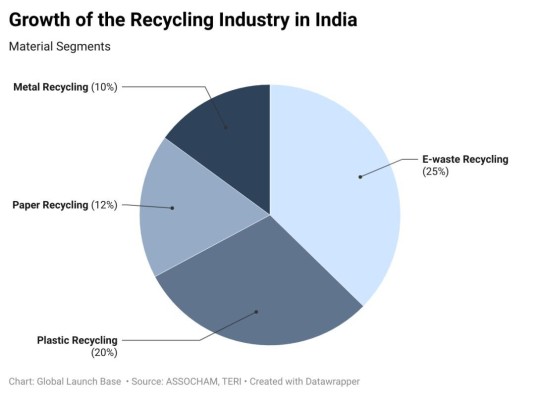
Figure: Growth of the Recycling Industry in India
In parallel, informal scrap dealers constitute a significant segment of India's recycling ecosystem, particularly in urban and peri-urban areas. These individuals or small-scale enterprises engage in the collection, dismantling, and resale of electronic waste using rudimentary techniques and manual labor. While informal recyclers play a role in diverting electronic waste from landfills and promoting resource recovery, their operations often lack environmental safeguards and pose risks to worker health and safety.
To address the challenges associated with informal recycling practices, government agencies in India have implemented regulatory frameworks aimed at formalizing and incentivizing responsible e-waste management. The E-Waste (Management) Rules, 2016, introduced by the Ministry of Environment, Forest and Climate Change, establish guidelines for the collection, segregation, transportation, and recycling of electronic waste. These rules mandate extended producer responsibility (EPR), requiring manufacturers to manage and finance the environmentally sound disposal of their products at the end of their lifecycle.
Furthermore, the Indian government has launched initiatives to promote public awareness and participation in e-waste recycling efforts. Campaigns such as Swachh Bharat Abhiyan and Clean India Mission emphasize the importance of responsible waste management practices, including the segregation and recycling of electronic waste. By fostering a culture of environmental stewardship and accountability, these initiatives aim to mobilize communities and industries towards sustainable consumption and production patterns.
Innovations in technology and business models have also played a pivotal role in shaping the landscape of India's recycling industry. Startups and entrepreneurs are leveraging digital platforms, data analytics, and IoT (Internet of Things) solutions to optimize waste collection, streamline logistics, and track the flow of materials within the recycling supply chain. By harnessing the power of innovation and entrepreneurship, India's recycling industry is poised to unlock new opportunities for efficiency, scalability, and environmental impact.
The emergence of India's recycling industry of electronic goods signifies a paradigm shift towards sustainable waste management practices and circular economy principles. By embracing innovation, regulation, and public participation, India has laid the groundwork for a more resilient and resource-efficient future. As the country continues to navigate the challenges of electronic waste management, collaboration among stakeholders will be paramount in realizing the full potential of the recycling industry to drive economic growth, environmental sustainability, and social wellbeing.
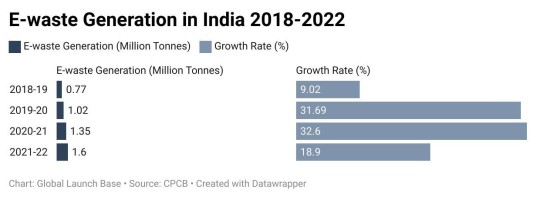
y:
Figure: E-waste Generation in India
India's exponential growth in electronic consumption has translated into a staggering volume of electronic waste generation. The proliferation of electronic gadgets, ranging from smartphones and laptops to household appliances and industrial machinery, has permeated every facet of Indian society. With a population exceeding 1.3 billion and a rapidly expanding middle class, the demand for electronic goods has reached unprecedented levels.
According to a report by the Central Pollution Control Board (CPCB), India generated approximately 3.2 million metric tons of e-waste in 2019, with an annual growth rate of 21%. This exponential growth trajectory underscores the urgent need for comprehensive e-waste management strategies that balance environmental preservation with economic prosperity.
The composition of electronic waste in India is diverse and encompasses a wide range of products, including obsolete televisions, refrigerators, air conditioners, washing machines, and electronic toys. Additionally, the proliferation of personal computing devices such as smartphones, tablets, and laptops has contributed significantly to the e-waste stream. These devices often contain valuable metals and components, making them lucrative targets for recycling and resource recovery.
Furthermore, the lifespan of electronic products in India tends to be relatively short due to factors such as rapid technological obsolescence, frequent upgrades, and shifting consumer preferences. As a result, a significant portion of electronic goods is discarded prematurely, exacerbating the e-waste challenge.
The management of electronic waste poses multifaceted challenges, including inadequate infrastructure, limited awareness among consumers, and the prevalence of informal recycling practices. Without effective intervention, the accumulation of electronic waste not only threatens environmental integrity but also jeopardizes human health and wellbeing.
In light of these challenges, the Indian government has recognized the importance of addressing e-waste management comprehensively. Initiatives such as the Digital India campaign and the Make in India initiative have spurred economic growth and technological innovation but have also underscored the need for sustainable consumption and production practices.
The scale and complexity of India's electronic waste challenge necessitate concerted efforts from all stakeholders, including government agencies, manufacturers, recyclers, and consumers. By adopting a holistic approach that integrates regulatory frameworks, technological innovations, and public awareness campaigns, India can chart a path towards a more sustainable and circular economy.
As India continues its journey towards economic prosperity and technological advancement, the responsible management of electronic waste will play a pivotal role in shaping the nation's environmental footprint and legacy for future generations. Through collaborative action and collective commitment, India can harness the potential of its recycling industry to mitigate environmental degradation, promote resource conservation, and foster sustainable development.
The Indian government is taking steps to formalize the e-waste recycling industry. In 2011, it introduced the E-Waste (Management) Rules, which require manufacturers and brands to take back and recycle their products. However, the implementation of these rules has been slow and uneven.
The Indian electronic goods recycling industry is a complex and rapidly evolving landscape. It is characterized by a mix of formal and informal sectors, with the informal sector currently dominating the market. This has both positive and negative implications, as we will explore below.
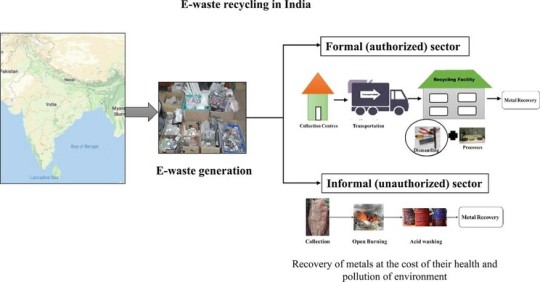
Formal sector:
Registered e-waste recyclers: These are companies that have been authorized by the government to collect, process, and dispose of e-waste in an environmentally sound manner. They typically have invested in sophisticated recycling infrastructure and employ trained personnel.
Advantages: Formal sector recyclers offer a more responsible and sustainable way to recycle e-waste. They are able to extract valuable materials from e-waste, such as metals, plastics, and glass, which can then be used to make new products. This helps to conserve resources and reduce pollution.
Disadvantages: Formal sector recyclers can be more expensive than informal recyclers. This is because they have to comply with stricter environmental regulations and pay for the cost of their infrastructure and personnel.
Informal sector:
Backyard and community-based operations: These are small-scale operations that typically collect e-waste from households and businesses. They then manually extract valuable materials, such as copper and gold, which they sell to scrap metal dealers.
Advantages: Informal recyclers are often able to offer lower prices than formal recyclers. This is because they do not have to comply with the same environmental regulations and do not have the same overhead costs.
Disadvantages: Informal recycling operations often pose serious health and environmental risks. They often burn e-waste to extract metals, which releases toxic fumes into the air. They also often do not properly dispose of hazardous materials, such as lead and mercury, which can contaminate soil and water.
The future of the Indian e-waste recycling industry is likely to be shaped by a number of factors, including:
The continued growth of the Indian economy: As the Indian economy grows, so too will the amount of e-waste that is generated. This will create a demand for more e-waste recycling capacity.
Increasing government regulation: The Indian government is likely to continue to introduce stricter regulations on e-waste recycling. This will help to level the playing field between formal and informal recyclers and encourage more responsible recycling practices.
Technological innovation: New technologies are emerging that can make e-waste recycling more efficient and cost-effective. This could help to make formal sector recycling more competitive with informal recycling.
Challenges and Opportunities
Despite the commendable efforts of the recycling industry, several challenges persist. One major obstacle is the prevalence of informal recycling practices, characterized by rudimentary techniques and inadequate safety measures. These informal recyclers, often operating in unregulated environments, pose environmental and health hazards while contributing to resource wastage.
However, amidst these challenges lie significant opportunities for innovation and growth. The Indian government has introduced several regulatory frameworks to promote responsible e-waste management, including the E-Waste (Management) Rules, 2016. These regulations mandate extended producer responsibility (EPR), compelling manufacturers to take accountability for the entire lifecycle of their products, from production to disposal.
Technological Innovations Driving Sustainability
In recent years, technological advancements have played a pivotal role in enhancing the efficiency and sustainability of e-waste recycling processes. Innovations such as automated sorting systems, chemical recycling techniques, and modular design approaches have revolutionized the industry, enabling greater resource recovery while minimizing environmental impact.
Furthermore, the advent of blockchain technology holds promise for enhancing transparency and traceability within the recycling supply chain. By leveraging blockchain-enabled platforms, stakeholders can securely track the movement of e-waste throughout its lifecycle, ensuring compliance with regulatory standards and promoting ethical practices.
Emerging Indian Companies in the Recycling Industry
Attero Recycling: Attero Recycling is a leading electronic waste management company in India. It specializes in recycling and refurbishing electronic devices, including smartphones, laptops, and televisions, while ensuring environmentally sustainable practices.
Gem Enviro Management Pvt. Ltd.: Gem Enviro Management is a pioneer in the field of electronic waste management and recycling in India. The company offers end-to-end solutions for the collection, dismantling, and recycling of electronic waste, adhering to international standards and regulations.
E-Parisaraa Pvt. Ltd.: E-Parisaraa is a Bangalore-based e-waste management company that provides environmentally responsible solutions for electronic waste recycling. The company focuses on resource recovery and material reuse through advanced recycling processes.
Ecoreco: Ecoreco is an electronic waste management company that offers comprehensive recycling solutions for businesses, households, and government agencies in India. It utilizes state-of-the-art technology and best practices to ensure the safe and sustainable disposal of electronic waste.
Karma Recycling: Karma Recycling is a Delhi-based company that specializes in the refurbishment and resale of used smartphones. The company aims to extend the lifecycle of electronic devices by offering buyback and recycling services, thus reducing electronic waste generation.
Earth Sense Recycle: Earth Sense Recycle is a Mumbai-based e-waste management company that provides collection, recycling, and disposal services for electronic waste. The company focuses on promoting awareness and education about responsible e-waste management practices.
Virogreen India Pvt. Ltd.: Virogreen India is an ISO-certified e-waste management company that offers end-to-end solutions for the recycling and disposal of electronic waste. The company operates across multiple cities in India, catering to both corporate and individual clients.
Greentek Reman Pvt. Ltd.: Greentek Reman is a Hyderabad-based company that focuses on remanufacturing and refurbishing electronic components and devices. The company aims to reduce electronic waste by extending the lifespan of products through repair and reuse initiatives.
The Role of Consumer Awareness
Amidst the ongoing evolution of the recycling industry, consumer awareness remains a crucial factor in driving sustainable change. Educating consumers about the importance of responsible e-waste disposal, encouraging product repair and refurbishment, and promoting the purchase of eco-friendly electronics are vital steps towards fostering a culture of sustainability.
Conclusion
The Indian recycling industry of electronic goods stands at the intersection of environmental conservation, technological innovation, and economic development. By embracing sustainable practices, leveraging cutting-edge technologies, and fostering widespread awareness, India has the potential to emerge as a global leader in e-waste management.
As we navigate the complexities of a digital age, the journey towards a circular economy hinges on our collective commitment to redefining the way we produce, consume, and dispose of electronic goods. In the pursuit of a greener, more sustainable future, the Indian recycling industry serves as a beacon of hope, demonstrating the transformative power of innovation and collaboration in tackling one of the most pressing challenges of our time.
About Global Launch Base:
Global Launch Base helps international startups expand in India. Our services include market research, validation through surveys, developing a network, building partnerships, fundraising, and strategy revenue growth. Get in touch to learn more about us.
Contact Info:
Website: www.globallaunchbase.com
LinkedIn: https://www.linkedin.com/company/globallaunchbase/
Email: [email protected]
#CircularEconomy#India#GreenTechnology#EWaste#EWasteRecyclingCenters#ReduceReuseRecycle#Electronics#SustainableDevelopment#DigitalWasteManagement#EnvironmentalSustainability#EWasteAwareness#TechRecycling#ResponsibleConsumption
0 notes
Text

1 note
·
View note
Text
Discover the best practices for using full spectrum Delta-9 gummies to ensure a safe and effective experience. Explore tips and guidelines for responsible consumption
#Delta9Gummies#CannabisWellness#SafeUsage#Delta9THC#CannabisEdibles#HolisticHealth#THCProducts#CannabisEducation#ResponsibleConsumption#WellnessInsights
0 notes
Text



#senegal#kebetu#fyp#galsen#buzz#seneweb#african#SDGs#ZeroHunger#HealthForAll#QualityEducation#GenderEquality#CleanWater#AffordableEnergy#DecentWork#InnovationForAll#ReducingInequality#SustainableCities#ResponsibleConsumption#ClimateAction#LifeBelowWater#LifeOnLand#PeaceAndJustice#GlobalPartnerships#UNDP#FAO#WHO#UNICEF#UNEP#WorldBank
0 notes
Text
Embracing Sustainability: Nurturing a Greener Future

Introduction: In an era where the need for environmental consciousness has never been more apparent, the concept of sustainability has taken center stage. As we recognize the urgent need to protect our planet and its resources, more people are joining the movement towards sustainable living. In this blog, we will explore the various aspects of sustainability, from eco-friendly practices to ethical consumption, and discover how each individual can contribute to building a greener future for generations to come.
Understanding Sustainability: To embark on the path of sustainability, it is crucial to comprehend its meaning and significance. We will delve into the principles of sustainability, including the triple bottom line—environmental, social, and economic factors. By understanding the interconnections between these aspects, we can embrace a holistic approach towards sustainable living.
Sustainable Practices at Home: Our daily choices and habits at home play a significant role in minimizing our environmental impact. We will explore eco-friendly practices, such as reducing energy consumption, conserving water, adopting recycling and composting, and embracing a zero-waste lifestyle. Additionally, we will discuss the benefits of sustainable home design, incorporating renewable energy sources, and using eco-friendly materials.
Sustainable Food and Agriculture: Food production and consumption have a profound impact on the environment. We will delve into sustainable food choices, such as organic and locally sourced produce, supporting fair trade practices, reducing food waste, and embracing plant-based diets. We will also explore the importance of sustainable agriculture, regenerative farming techniques, and the preservation of biodiversity.
Sustainable Fashion and Consumer Choices: The fashion industry is notorious for its environmental and social impacts. We will discuss sustainable fashion choices, including ethical clothing brands, upcycling and secondhand shopping, and embracing a minimalist wardrobe. Furthermore, we will explore the concept of conscious consumerism and the importance of supporting businesses that prioritize sustainability and ethical practices.
Sustainable Transportation: Transportation is a significant contributor to greenhouse gas emissions. We will explore sustainable transportation options, including public transportation, cycling, walking, and carpooling. We will also discuss the benefits of electric vehicles and the importance of urban planning that promotes accessibility and reduces reliance on fossil fuels.
Community Engagement and Advocacy: Creating a sustainable future requires collective action. We will explore ways to engage with our communities, promote sustainability initiatives, and advocate for policies that prioritize the environment. From organizing local events to participating in grassroots movements, we will discuss how individuals can make a difference on a larger scale.
Conclusion: Sustainability is not just a buzzword but a way of life that fosters a harmonious relationship between humans and the planet. By embracing sustainable practices in our daily lives, we can contribute to preserving the Earth's resources for future generations. This blog aims to inspire and empower individuals to take steps towards a greener future, where sustainable living becomes the norm. Together, let us embark on this transformative journey and nurture a world that thrives on sustainability.
#SustainabilityMatters#GreenLiving#EcoFriendly#SustainableLifestyle#EnvironmentalAwareness#ConsciousLiving#ReduceReuseRecycle#ClimateAction#EthicalChoices#SustainableFuture#GoGreen#NatureConservation#ZeroWaste#RenewableEnergy#SustainableFashion#HealthyPlanet#ResponsibleConsumption#SustainableDevelopment#ProtectOurEarth#CommunityEngagement
1 note
·
View note
Text
Circular Economy Apps: $4.5B to $12.8B by 2034
Circular Economy Platform Apps Market : The transition towards a sustainable and regenerative economy is accelerating, with circular economy platform apps playing a crucial role in reducing waste, optimizing resource use, and promoting eco-friendly practices. These digital solutions are revolutionizing industries by enabling businesses and consumers to participate in circular economic activities seamlessly.
To Request Sample Report: https://www.globalinsightservices.com/request-sample/?id=GIS10901 &utm_source=SnehaPatil&utm_medium=Article
Market Growth and Drivers
The global circular economy platform apps market is experiencing rapid growth, driven by increasing awareness of environmental sustainability and the demand for resource-efficient solutions. Organizations and consumers alike are adopting these platforms to minimize waste, extend product life cycles, and encourage reuse and recycling.
Key drivers fueling the market include:
Technological advancements — AI-driven and blockchain-enabled platforms enhance traceability and efficiency in the circular economy.
Government regulations — Many countries are implementing stringent sustainability policies that promote circular economic models.
Rising consumer awareness — More individuals are seeking eco-conscious alternatives to traditional consumption patterns.
Corporate sustainability initiatives — Businesses are integrating circular economy principles into their operations to improve brand reputation and regulatory compliance.
Key Trends in the Industry
The integration of AI, IoT, and big data analytics is shaping the future of circular economy apps. These technologies facilitate real-time monitoring, predictive analytics, and automated resource optimization, ensuring sustainable consumption and production processes. Additionally, peer-to-peer sharing platforms and product-as-a-service (PaaS) models are gaining popularity, offering new ways to reduce waste and improve efficiency.
Future Outlook
As sustainability becomes a core focus for businesses and governments, the circular economy platform apps market is poised for substantial expansion. With continued innovation and digital transformation, these platforms will play a pivotal role in building a sustainable future.
Trending Hashtags
#circulareconomy #sustainability #greentech #zerowaste #ecoapps #blockchain #ai #iot #smartsolutions #wastereduction #recycling #digitaltransformation #environmentaltech #climateaction #sustainablebusiness #greeninnovation #cleantech #carbonfootprint #renewableresources #smartcities #futuretech #productaservice #greenapps #circulareconomyplatform #wastemanagement #ecoentrepreneur #regenerativeeconomy #techforgood #sustainabilitytech #responsibleconsumption
Research Scope:
· Estimates and forecast the overall market size for the total market, across type, application, and region
· Detailed information and key takeaways on qualitative and quantitative trends, dynamics, business framework, competitive landscape, and company profiling
· Identify factors influencing market growth and challenges, opportunities, drivers, and restraints
· Identify factors that could limit company participation in identified international markets to help properly calibrate market share expectations and growth rates
· Trace and evaluate key development strategies like acquisitions, product launches, mergers, collaborations, business expansions, agreements, partnerships, and R&D activities
About Us:
Global Insight Services (GIS) is a leading multi-industry market research firm headquartered in Delaware, US. We are committed to providing our clients with highest quality data, analysis, and tools to meet all their market research needs. With GIS, you can be assured of the quality of the deliverables, robust & transparent research methodology, and superior service.
Contact Us:
Global Insight Services LLC 16192, Coastal Highway, Lewes DE 19958 E-mail: [email protected] Phone: +1–833–761–1700 Website: https://www.globalinsightservices.com/
0 notes
Text

Today on #malcified I’d like to share this sketch called #innerhealing on #sustainability and a few words.
Sustainability: meeting the needs of the present without compromising the ability of future generations to meet their own needs. - UN
Our indiscriminate use of each other, land, and natural resources at a rate faster and greater than it can naturally replenish is demonstrated in our daily life as well.
- A culture of use and dispose - food, products, humans, animals, land, plants, resources…everything!
-The global workforce sufferring from #burnouts due to extreme workloads and overworking
- Inadequate and ineffective #worklifebalance measures where #HumanResources (#HR) departments have weak autonomy, functioning purely as a target-driven business process
- Businesses striving to accomplish ever-growing unrealistic revenue, investor returns, and profit projections, cutting costs and compromising on health, safety, security, well-being of its employees - full-time, part-time, and contract staff
- Hiring #Thirdpartyserviceproviders (#TPSP) without performing adequate #DueDiligence, that compromise on major #legal #compliance, #reputational, #environmental #humanrights #riskfactors by procuring cheap labor and raw materials from jurisdictions without proper #humanrights awareness, laws, and historical background, countries without appropriate #governance, Governmental frameworks like #sustainabilitypolicy, #climatepolicy #Laborlaws and support frameworks, corporate #ESG frameworks, #environmentallaws, #regulations, #judiciary, #enforcement and #implementation frameworks and systems
-consumeristic and materialistic society focused purely on indiscriminate production and consumption, with no/less awareness of their individual #carbonfootprint, of #responsibleconsumption (#SDG12)
-#throwawaysociety where single-use disposable items are expected, #unboxing and other trash-generating practices are glorified, ephemeral products and goods are preferred to life-time durable ones.
The list goes on…
Maybe, our behavior has something to do with the way we look and feel about ourselves. We’re all maybe consciously and unsconsciously insecure about some aspect of our life.
Maybe, when we feel good and appreciated from within, we appreciate and look after our surroundings well. So, working on being more compassionate, content, and appreciative of ourselves is a good place to begin, then maybe, together, we can do better.
Seeking an inner healing for each of us!
Regardless, only the beings present now and in the future shall suffer from our own over-indulgence. The land, nature, oceans, whatever we call them, have been here long before and shall evolve and replenish from our relentless onslaught, eventually. With or without us.
#awareness#malcified#oneness#within is without#return to the source#wholeness#nature#cartooning#artwork#painting#sustainability#GARP#SCR#climate change#third party risk#due diligence#human rights#climate policy#burn out#risk management#labor laws#Human Resources#best practice#better practice#cultural change#SDG#SDG12#unboxing#garbage#work life
0 notes
Text
From Farm to Fridge: Revolutionizing Egg Packaging
As we stride into an era of heightened environmental consciousness and consumer demand for quality, egg packaging is undergoing a remarkable transformation.
The latest innovations in this field are not only focused on protecting the delicate contents but also on sustainability, using biodegradable and recyclable materials to minimize ecological impact. Smart packaging solutions are integrating technology to monitor freshness, track sourcing, and enhance shelf life, ensuring that consumers receive the highest quality eggs. Designs are becoming increasingly ergonomic, with features like shock absorption and secure locking mechanisms to prevent breakage. Moreover, clear labeling practices are being adopted to inform consumers about the origin, nutritional benefits, and production methods, fostering transparency and trust. With a growing emphasis on reducing waste and promoting eco-friendly practices, egg packaging is leading the way in sustainable packaging innovations. This shift reflects a broader trend towards responsible consumption and production, aligning with global sustainability goals. As we look to the next decade, these advancements in egg packaging are set to revolutionize the market, offering consumers not just a product, but a sustainable choice that prioritizes both quality and the environment.
#EggPackaging #SustainablePackaging #EcoFriendly #SmartPackaging #FreshnessGuaranteed #InnovativePackaging #BiodegradableMaterials #RecyclablePackaging #ZeroWaste #EcoPackaging #PackagingInnovation #ResponsibleConsumption #FutureOfPackaging #QualityAssurance #TransparentLabeling
0 notes
Text
Revolutionizing Waste Management: The Rise of "WasteMaterial" E-Waste Collection Centers
E-Waste Collection Centers

Understanding the Problem
Electronic devices have become indispensable aspects of modern life, yet their disposal presents complex challenges. E-waste comprises a diverse range of materials, including toxic substances like lead, mercury, and cadmium, which can contaminate soil and water sources if improperly discarded. Moreover, electronic gadgets often contain valuable resources like gold, silver, and rare earth metals, which, if recycled effectively, can mitigate the need for environmentally destructive mining operations.
Despite the growing awareness of these issues, the majority of e-waste still ends up in landfills or is exported to developing countries with lax environmental regulations. This unsustainable disposal contributes to pollution, resource depletion, and adverse health effects for both humans and ecosystems.
Introducing WasteMaterial
WasteMaterial emerges as a beacon of sustainability and innovation in the realm of waste management. Specializing in the collection and recycling of electronic waste, WasteMaterial operates a network of state-of-the-art E-Waste Collection Centers strategically located in communities worldwide.
The Role of E-Waste Collection Centers
These centers serve as convenient hubs where individuals and businesses can responsibly dispose of their old electronic devices. Equipped with advanced sorting and processing technologies, WasteMaterial ensures that every component of e-waste is managed efficiently and sustainably.
Key Features of WasteMaterial’s E-Waste Collection Centers:
Accessibility: WasteMaterial prioritizes accessibility by establishing E-Waste Collection Centers in easily reachable locations within urban and suburban areas. This accessibility encourages widespread participation in e-waste recycling efforts.
Education and Awareness: Each E-Waste Collection Center is staffed with knowledgeable professionals who provide information and guidance on the importance of e-waste recycling. By raising awareness about the environmental and social impacts of improper disposal, WasteMaterial fosters a culture of responsible consumption and waste management.
Convenience: WasteMaterial streamlines the e-waste recycling process by offering convenient drop-off services at its E-Waste Collection Centers. Customers can simply visit the nearest center and deposit their old electronic devices, knowing that they will be recycled ethically and sustainably.
Transparency: WasteMaterial prioritizes transparency throughout the e-waste recycling process. Customers can track the journey of their discarded electronics from collection to recycling, ensuring accountability and trust.
Innovation: WasteMaterial continuously invests in research and development to enhance its e-waste recycling technologies. By staying at the forefront of innovation, WasteMaterial maximizes resource recovery while minimizing environmental impact.
The Impact of WasteMaterial’s E-Waste Collection Centers
Through its commitment to sustainability and social responsibility, WasteMaterial is transforming the landscape of waste management. By diverting e-waste from landfills and implementing environmentally sound recycling practices, WasteMaterial conserves natural resources, reduces pollution, and protects human health.
Moreover, WasteMaterial’s holistic approach to e-waste management fosters community engagement and empowerment. By providing accessible recycling solutions and educational resources, WasteMaterial empowers individuals and businesses to become active participants in the transition towards a circular economy.
Conclusion
In a world grappling with the consequences of rampant consumerism and unsustainable production practices, WasteMaterial stands as a beacon of hope and progress. Through its innovative E-Waste Collection Centers, WasteMaterial is redefining waste management, one electronic device at a time. Together, we can build a more sustainable future for generations to come. Join WasteMaterial in its mission to create a world where waste is no longer wasted.
#WasteMaterialRevolution#EWasteRecycling#SustainableTech#CircularEconomy#GreenInnovation#ResponsibleConsumption#EnvironmentalProtection#CommunityEngagement#TechForGood#WasteManagementSolutions
0 notes
Text

🌿 Small Acts, Big Impacts! 🌍 Happy New Year from Eco Paryavaran! 🎉 Let's kick off 2023 with a commitment to make a positive difference in our world. 💚 Here's to a year filled with conscious choices and sustainable actions! 🌱✨
As we usher in the New Year, let's reflect on the power of small acts that collectively create a big impact. Every eco-friendly decision contributes to a healthier planet for us and future generations. 🌏💙
Here are a few simple resolutions to inspire your eco-journey in 2023:
🛒 #ChooseSustainable: Opt for products with eco-friendly packaging.
🚗 #CarpoolingChampion: Share rides and reduce carbon emissions.
🌱 #ZeroWasteGoals: Embrace a zero-waste lifestyle, one step at a time.
💧 #ConserveWater: Be mindful of water usage in daily activities.
🌞 #GoSolar: Explore solar energy options for your home.
🌿 #PlantMoreTrees: Contribute to reforestation efforts in your community.
🍃 #EatGreen: Incorporate more plant-based meals into your diet.
🚮 #TrashTagChallenge: Participate in local clean-up initiatives.
🚰 #ReusableRevolution: Ditch single-use items for reusable alternatives.
🚴 #BikeLife: Choose cycling over driving for short distances.
Remember, it's the collective impact of these small actions that brings about positive change. Let's join hands and create a ripple effect of sustainability! 🌊✨
Tag your eco-squad and share your green resolutions using #EcoParyavaranNewYear. Together, let's make 2023 the year of environmental consciousness! 🌿💫 Happy New Year from Eco Paryavaran! 🎊
#NewYearNewHabits #GreenLiving #SustainableChoices #EcoFriendlyLife #PlanetFirst #ClimateActionNow #GreenGoals #ChangeMakers #EnvironmentalAwareness #ActForNature #EcoWarrior #SmallChangesBigImpact #ConsciousLiving #ResponsibleConsumption #ReduceReuseRecycle #ProtectOurPlanet #Happy2023 #EcoFriendlyCommunity #GreenInspiration #LoveTheEarth 🌎💚
0 notes
Text

Introducing the Zero Plastic Revolution!
Are you tired of contributing to the ever-growing plastic pollution problem? Join Viren Aikyam in his mission to replace plastic with sustainable alternatives like brass, bamboo, and mud utensils!
Plastic has become a menace to our planet, choking our oceans, harming wildlife, and polluting our environment. It's time to take action and make a change. Viren Aikyam, a passionate politician, has paved the way for a plastic-free future by introducing innovative alternatives that are not only eco-friendly but stylish too!
Say goodbye to plastic cutlery that ends up in landfills. Embrace durable and sleek brass utensils that can be used over and over again without harming the environment. #VirenAikyam #climatechange #responsibleconsumption #ZeroPlasticRevolution#sdgs
0 notes